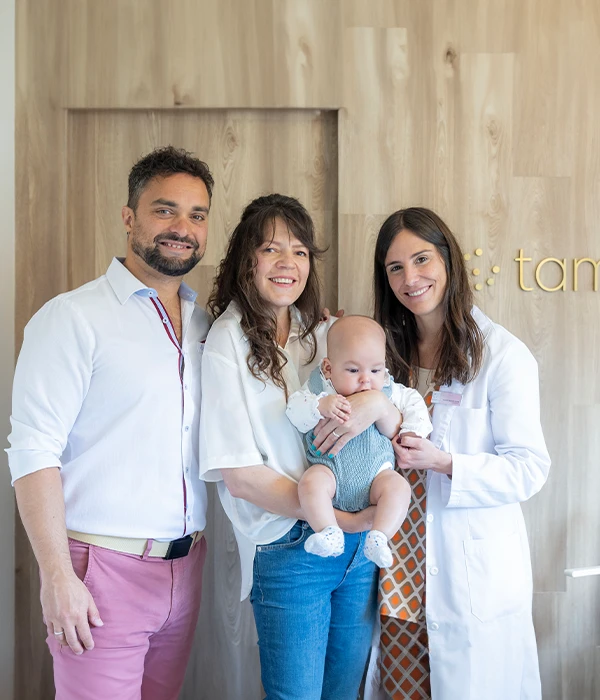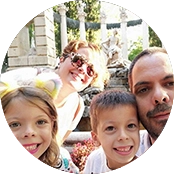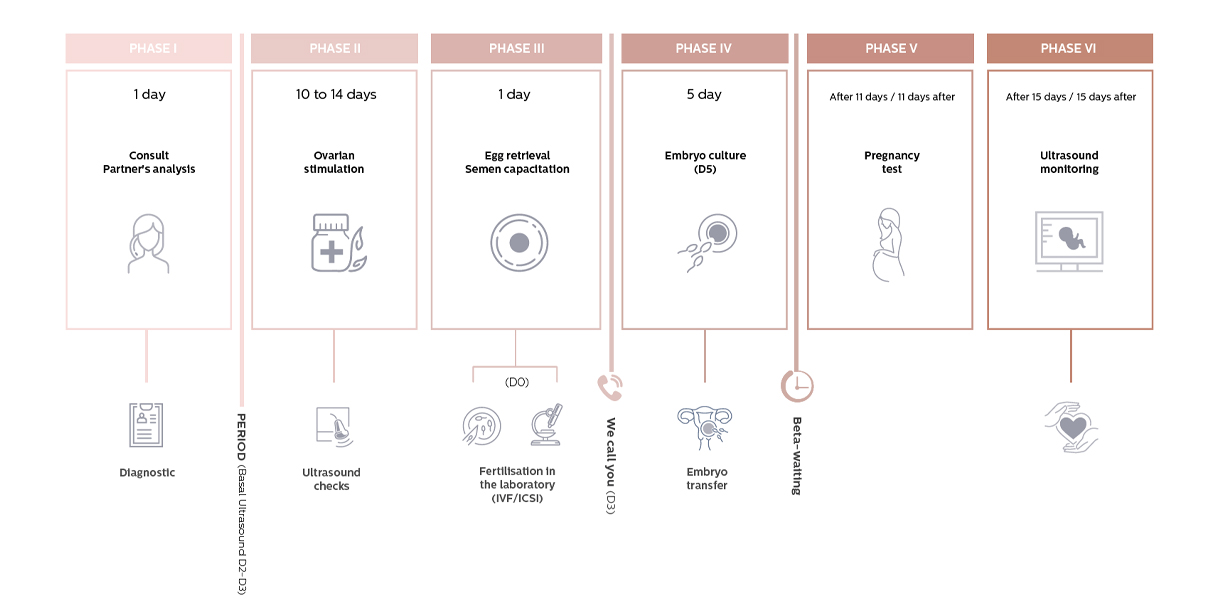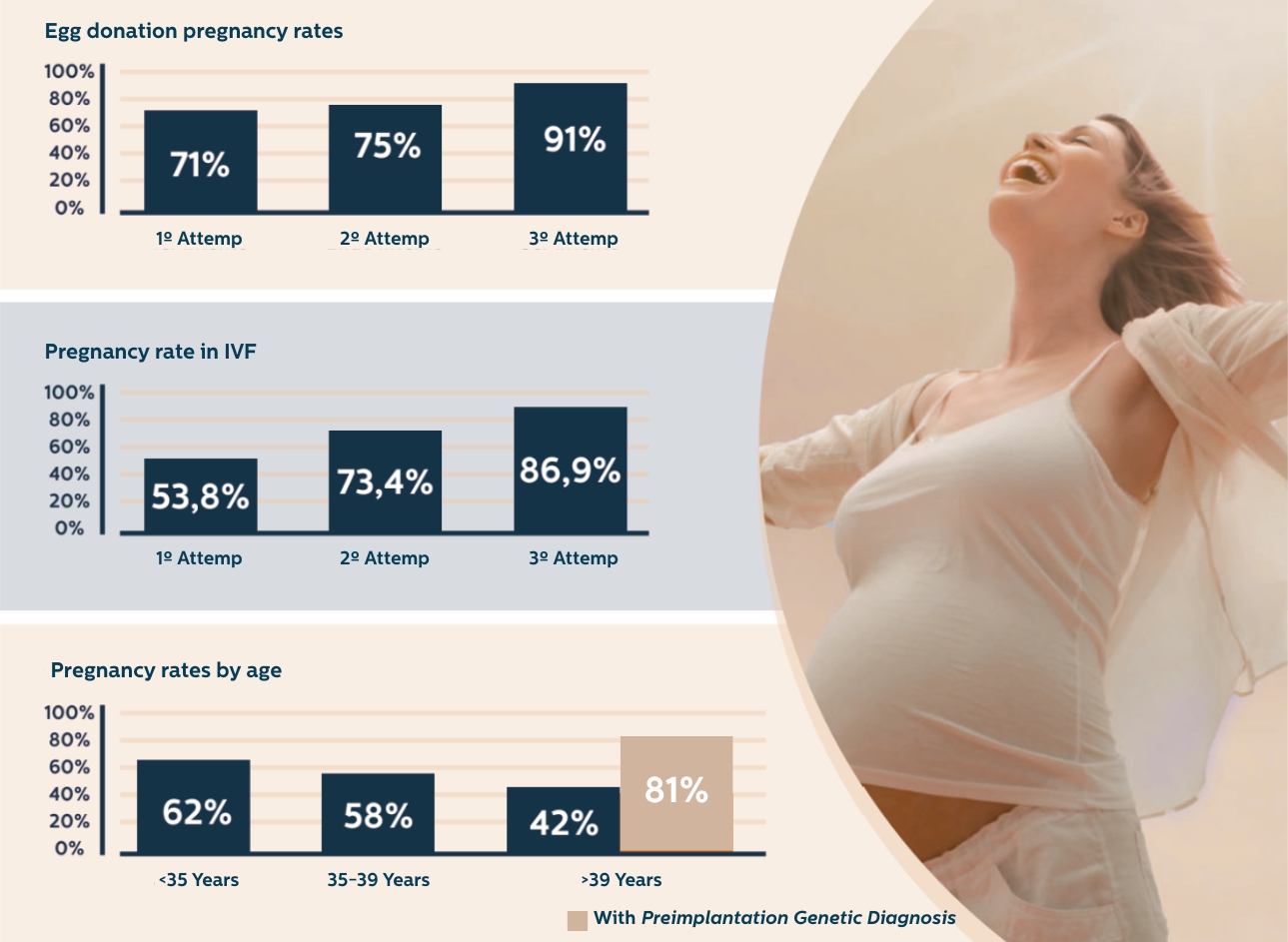In vitro fertilisation (IVF)
In vitro fertilisation (IVF) is the most common treatment in reproductive medicine. It allows the fertilisation of eggs by sperm outside the woman’s body. The embryos are then transferred directly into the uterus to promote implantation.
The personalisation of IVF treatment at Tambre allows us to achieve high success rates.

Would you like us to study your case?
What is In Vitro Fertilisation (IVF)?
In vitro fertilisation, also known as IVF, is the most widely used assisted reproduction technique. It consists of fertilising the eggs with the sperm outside the woman’s body, in a specialised assisted reproduction laboratory. The resulting embryos are then transferred to the mother’s uterus to promote implantation and start gestation.
It is a very versatile technique that also allows us to: use donor eggs and/or sperm, gestate a baby without a partner or with a partner of the same sex (ROPA method), and even carry out a pre-implantation genetic diagnosis (PGD) that helps us to reduce the risk of having a baby with genetic diseases.
This is why in vitro fertilisation is a suitable treatment in the following cases:
- Repeated miscarriages
- Failure of previous artificial inseminations
- Infertility of unknown origin
- Women seeking motherhood at an advanced age
- Endometriosis
- Polycystic Ovary Syndrome
- Fallopian tube obstruction or tubal ligation
- Vasectomised men
- Sperm shortage or lack of sperm motility
- History of genetic diseases
- Desire for single motherhood by choice
- Lesbian, bisexual or transgender parenthood (ROPA method)
Complete Guide to In Vitro Fertilisation (IVF)
Find out everything you need to know about In Vitro Fertilisation (IVF) with our comprehensive guide. We are here to help you. We send it in pdf format to your email.
We are here to help you!
In Vitro Fertilisation Techniques (IVF)
There are two types of techniques:
CONVENTIONAL IVF
In conventional IVF, oocytes and an already capacitated sperm sample are combined in a culture dish to allow fertilisation to occur naturally and spontaneously.
IVF / ICSI
In IVF-ICSI, the embryologist selects and injects a sperm directly into the cytoplasm of the oocyte. The manipulation of the gametes is greater, but success rates increase if the specialist is skilled in the technique.
We are with you every step of the way
In vitro fertilization (IVF) is currently the most widely used technique due to its good results and high fertilization rates.
Do you need more information?
Types of In Vitro Fertilisation (IVF)
IVF with your own gametes
For couples with fertility problems, such as endometriosis or male factor, among others, who wish to conceive using their own gametes.
IVF with donated eggs
This technique offers an option for women who cannot produce eggs of sufficient quality to conceive on their own.
IVF with donor sperm
IVF is used for couples with severe male fertility problems or women without a partner. In both cases, we use sperm from an anonymous donor.
IVF with donated sperm. ROPA Method
It offers a couple of two women the opportunity to have shared biological children, using donor sperm to fertilise one of the women’s eggs.
At Tambre we carry out personalised treatments adapted to the particular needs of our patients. Once we have studied the possible causes and determined the origin of the couple’s infertility, we recommend the most appropriate IVF treatment.
By using drugs, whose action is similar to that of certain hormones produced by the woman, we try to develop several follicles, which contain the eggs. In this phase, we carry out several ultrasound checks.
When the oocytes have reached maturity, they are extracted by means of puncturing the ovaries and aspiration of the follicles, under ultrasound and vaginally. This procedure is performed on an outpatient basis under local anaesthesia and mild sedation. The eggs obtained are prepared and sorted in the laboratory.
Semen capacitation
After collecting the semen sample from the male, it is taken to the Tambre laboratory for preparation. If the sample comes from our own sperm donor bank or was cryopreserved, it is similarly processed and prepared for fertilisation of the eggs in the Andrology laboratory.
Fertilisation in the laboratory: IVF/ICSI
In the laboratory, fertilisation is facilitated by joining the oocyte to the sperm, either in a conventional IVF cycle – more natural and spontaneous – or using the ICSI technique, which consists of selecting a spermatozoon that is deposited directly inside the oocyte.
16-18 hours after IVF or ICSI the number of fertilised eggs will be determined and we will see how many embryos we have. These will be left in the incubator for observation during the following days of culture with special media. Thanks to the Time Lapse system, we can assess the evolution and quality of the embryos, which continue to develop without the need to manipulate them.
At Tambre, we culture the embryos until day 5/6 (D5/6), after which they are transferred or frozen, as appropriate.
Embryo transfer is a simple and painless procedure performed with the aid of abdominal ultrasound. It consists of depositing the embryos in the uterine cavity, using a very fine cannula. In order to favour embryo implantation,hormonal treatment is also prescribed so that the endometrium is in the best condition at the time of the transfer.
The embryo transfer is performed at the blastocyst stage (D5/6). The day of the transfer depends on personal circumstances.
The Spanish Assisted Reproduction Law allows a maximum number of 3 embryos to be transferred. This is to avoid multiple pregnancies and their possible risks. At Tambre we transfer a single embryo, SET (single embryo transfer), this can be individualised for each patient.
Beta-waiting
This is the period between the transfer and the pregnancy test.
The pregnancy test is performed 10 to 11 days after the embryo transfer using a blood test to determine the values of a hormone that is only produced by the embryo, beta hCG. Depending on the level of this hormone in the blood we can confirm the pregnancy and its evolution.
If the beta hCG hormone test is positive, we must wait two more weeks before we carry out the first ultrasound scan to check the development of the embryo. It is not advisable to do it before this time as in many cases it can create confusion and uncertainty. If all is well, the patient will be discharged from assisted reproduction.
Personalised IVF treatments
In vitro fertilisation is a process that involves multiple steps that must be coordinated and adapted to the actual needs of each patient. This is why it is so important to place yourself in the hands of an experienced medical team who can design tailor-made treatment, as well as having a specialised laboratory equipped with the most advanced technology to increase the chances of success.
At Tambre we are specialists in Advanced Reproductive Medicine. We have highly experienced embryologists, nurses and doctors who are able to provide solutions to complex fertility cases.
Thanks to our team, we have managed to consolidate our reputation for more than four decades as a pioneering clinic in the world of assisted reproduction. This is demonstrated by our high success rates.
TAMBRE’S IN VITRO FERTILISATION (IVF) SUCCESS RATES
<35 years
35-39 years
>39 years
At Tambre we strive to improve our success rates every year, applying the latest technologies to our assisted reproduction treatments, and constantly renewing our processes and protocols.
We also have one of the lowest multiple pregnancy rates in Spain. Our recommendation and our approach is to perform single embryo transfers, which minimises the risks for both mother and baby.
The key to Tambre's success
Diagnosis and personalised treatments are the key to Tambre’s high success rates
Specialists in Advanced Reproductive Medicine
More than 47 years of medical excellence.
We design tailor-made treatments
State-of-the-art assisted reproduction laboratory
Our own andrology laboratory.
- RI Witness™ for the safety and traceability of gametes.
- GERI®: Embryo Incubator®.
- Fenomatch, we find the right egg donor and/or sperm donor and match them with you.
- Zymot-ICSI (Chip Fertile), selection of the best sperm before ICSI.
- You will have your own gynaecologist and nurse, except for emergencies, and the same medical team will follow your case in depth and attend you from the beginning to the end of the treatment.
- You will have a consultant from our Specialised Tambre Care team who will support you and answer any question you may have throughout the whole process.

Dreams come true
Real stories like yours

Ignacia e Israel llegaron sin expectativa y se fueron con la mejor noticia del mundo
“El miedo tienen que dejarlo fuera de la clínica. Hay que entrar con toda la convicción el mundo e intentar tirar para adelante”
Leer mas

Pilar y Pablo, fruto de la perseverancia de unos padres luchadores
“La paciencia y la actitud positiva son la clave. Fueron unos niños muy deseados. Lo volveríamos a hacer una y mil veces más”
Leer mas

“Nos llamaron cuando estábamos en el supermercado comprando jamón de York y no podíamos parar de llorar”
Leer mas

Raquel, Hernán… ¡y un bebé Tambre que baila flamenco!
“Recibir ayuda es algo que muchas veces necesitamos todos y no hay por qué no hacerlo en algo tan importante como formar una familia”
Leer mas

La historia de Elisa y su hijo Andrés
“Estoy muy contenta de haber luchado y haber sido tan cabezota. Hubiera seguido intentándolo de cualquiera de las maneras”
Leer mas

La esperanzadora historia de Beatriz y Roberto
“Tambre es una clínica completa, tiene una atención personal muy buena, una atención profesional muy buena y unos medios tecnológicos muy buenos”
Leer mas
We stay with you
Our support team is always at your side for whatever you need
Shall we call you?
Our support team is always at your side for whatever you need
Or send us an email to atpaciente@clinicatambre.com










